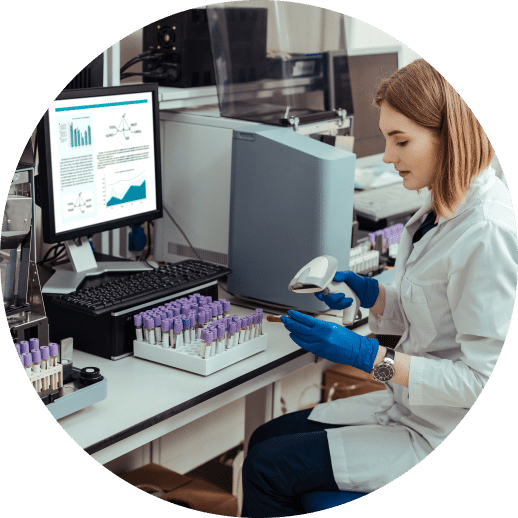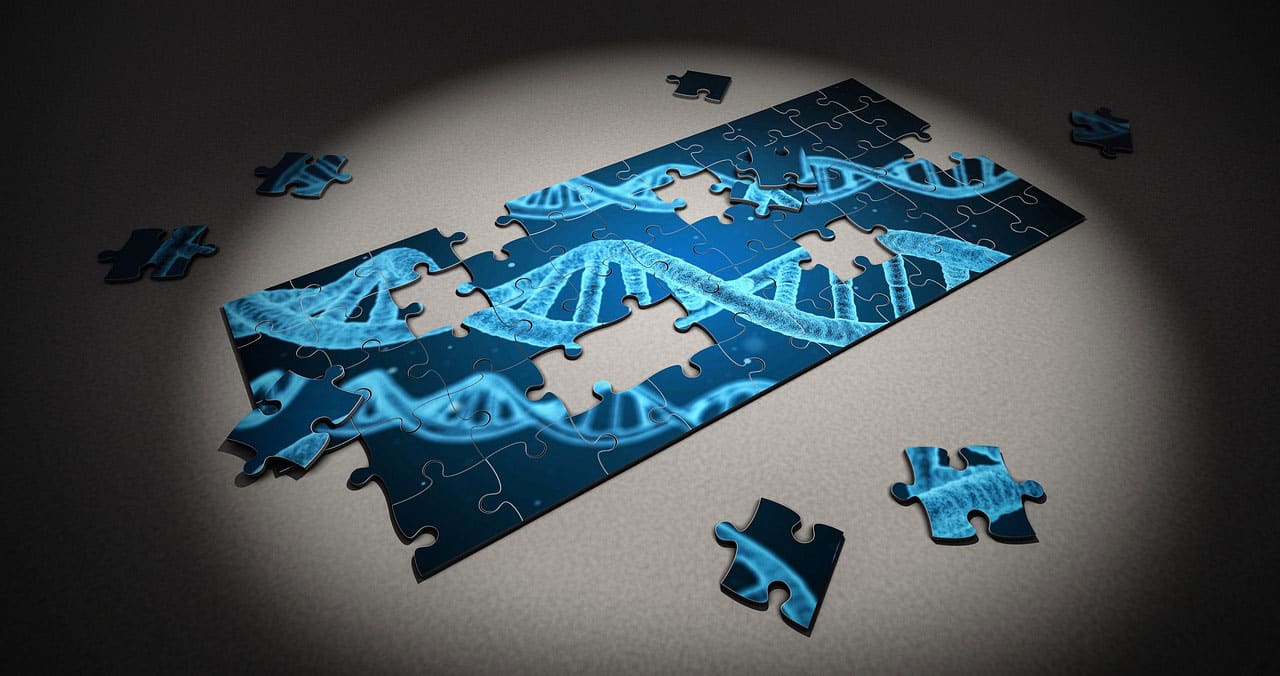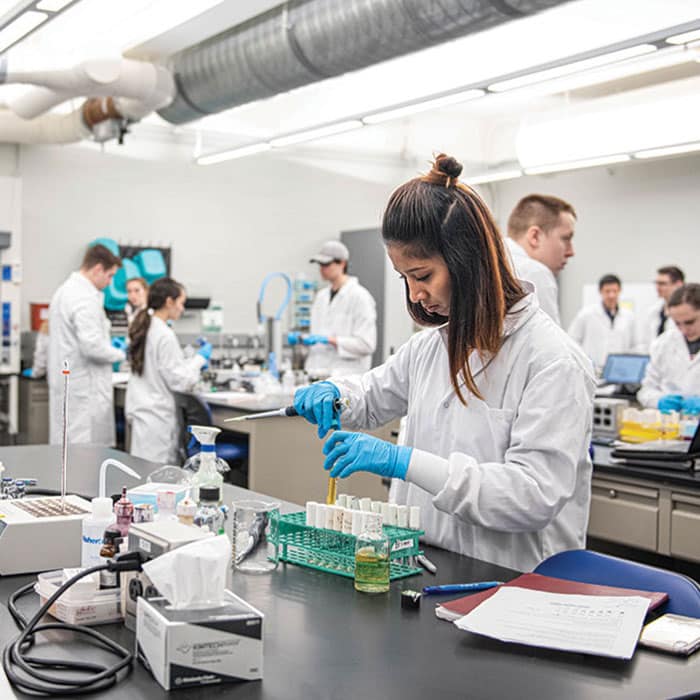Our Research
Research plays a vital role in improving our understanding about the role of genomics in the onset, progression, heritability and treatment of disease.

We’re committed to working with Genomics England, the National Institute for Health and Care Research (NIHR) and other partners to support genomic research projects in the region.
National NHS Genomics Research Collaborative
We contribute to the national NHS Genomics Research Collaborative, which has been set up to facilitate genomic research and development on a national scale.
The NHS GMS Research Collaborative is a partnership between the NHS GMS, Genomics England and the National Institute of Health and Care Research (NIHR) and is supported by a steering committee – an operational group which will review and give feedback on research proposals that require support from the NHS GMS. It will also rapidly evaluate the capacity, capability, and resource, of the NHS GMS to support research.
You can find out more about the collaborative and how to make a submission.


Research in the GOSH Rare Disease Laboratory
Our rare disease laboratory at GOSH has a core team of researchers, funded by the GOSH NIHR Biomedical Research Centre and various grants. The group comprises clinical scientists, post doctoral fellows, Clinical fellows and social scientists and works at the interface of translating research into clinical practice and is internationally renowned for translating research in prenatal diagnosis into clinical service. Current workstreams include;
- extending diagnoses in the 100,000 Genomes project
- applying new molecular technologies to improve prenatal diagnosis of monogenic disorders including non-invasive pre-natal diagnosis and rapid fetal exome sequencing
- developing methods of informed choice of sequencing testing both in the pre- and postnatal setting
- evaluating the experiences of parents and professionals with prenatal exome sequencing and examining the national implementation of this service.


- Mellis R, Chandler N, Jenkins L, Chitty LS. The role of sonographic phenotyping in delivering an efficient non-invasive prenatal diagnosis service for FGFR3-related skeletal dysplasias. Prenat Diagn. 2020 Mar 30;. doi: 10.1002/pd.5687. [Epub ahead of print] PubMed PMID: 32227640
- Jenkins L, Deans Z, Lewis C, Allen S. Delivering an accredited non-invasive prenatal diagnosis service for monogenic disorders and recommendations for best practice. Prenat Diagn. 2018 Jan;38(1):44-51 doi: 10.1002/pd.5197
- Chandler NJ, Ahlfors H, Drury S, Mellis R, Hill M, McKay FJ, Collinson C, Hayward J, Jenkins L, Chitty LS. Noninvasive Prenatal Diagnosis for Cystic Fibrosis: Implementation, Uptake, Outcome, and Implications. Clin Chem. 2019 Sep 24;. doi: 10.1373/clinchem.2019.305011. [Epub ahead of print] PubMed PMID: 31551312
- Best S, Wou K, Vora N, Van der Veyver I, Wapner R, Chitty LS. Promises, pitfalls and practicalities of prenatal whole exome sequencing. Prenat Diagn. 2018 Jan;38(1):10-19 doi: 10.1002/pd.5102
- Chandler N, Best S, Hayward J, Faravelli F, Mansour S, Kivuva E, Tapon D, Male A, DeVile C, Chitty LS. Rapid prenatal diagnosis using targeted exome sequencing: a cohort study to assess feasibility and potential impact on prenatal counselling and pregnancy management. Genet Med. 2018 Nov;20(11):1430-1437. doi: 10.1038/gim.2018.30. Epub 2018 Mar 29. PubMed PMID: 29595812
- Hay E, Hendersoin R, Mansour S, Deshpande C, Jones R, Nutan S, Mankad K, Young R, Moosajee M, Genomics England Research Consortium, Arno G. Expanding the phenotypic spectrum consequent upon de novo WDR37 missense variants. Clin Genet Aug;98(2):191-197. doi: 10.1111/cge.13795
- Bertrand R, Wang J, Xiong K, Thangavel C, Qian X, Ba-Abbad R, Liang Q,Simoes R, Sampaio S, Carss K, Raymond L, Robson A, Webster A, Arno G, Belga Ottoni Porto F, Chen R. Ceramide synthase TLCD3B is a novel gene associated with human recessive retinal dystrophy. Genet Med. 2020 doi: 10.1038/s41436-020-01003-x [Epub ahead of print]
- Schiff E, Daich Varela M, Robson A, Pierpont K, Ba-Abbad R, Nutan S, Zein W, Ullah E, Huryn L, Tuupanen S, Mahroo O, Michaelides M, Burke D, Harvey K, Arno G, Hufnagel R, Webster A. A genetic and clinical study of individuals with nonsyndromic retinopathy consequent upon sequence variants in HGSNAT, the gene associated with Sanfilippo C mucopolysaccharidosis. Am. J. Med Genet C. 2020 Sep;184(3):631-643 doi: 10.1002/ajmg.c.31822
- Vig A, Poulter J, Ottaviani D, Tavares E, Toropova K, Tracewska AM, Mollica A, Kang J, Kehelwathugoda O, Paton T, Maynes J, Wheway G, Arno G et al. DYNC2H1 hypomorphic or retina-predominant variants cause nonsyndromic retinal degeneration. Genet Med. 2020 Dec;22(12):2041-2051; doi: 10.1038/s41436-020-0915-1
- Khan M, Arno G, Fakin A, Parfitt D, Dhooge P, Albert S, Bax N, Duijkers L, Niblock N, Hau K, Bioch E, Schiff E, Piccola D, Hogden M, Hoyng C, Webster A, Cremers F, Cheetham M, Garanto A, Collin R. Mol Ther Nucleic Acids 2020 Sep 4;21:412-427 doi: 10.1016/j.omtn.2020.06.007
- Turro E et al Whole-genome sequencing of patients with rare diseases in a national health system. Nature 2020 Jul;583(7814):96-102doi: 10.1038/s41586-020-2434-2.
- Hill M, Hammond J, Lewis C, Mellis R, Clement E, Chitty LS. Delivering genome sequencing for rapid genetic diagnosis in critically ill children: parent and professional views, experiences and challenges. Eur J Hum Gen 2020;28(11):1529-40
- Sanderson SC, Hill M, Patch C, Searle B, Lewis C, Chitty LS. Delivering genome sequencing in clinical practice: an interview study with healthcare professionals involved in the 100 000 Genomes Project. BMJ Open. 2019;9(11):e029699
- Lewis C, Sanderson S, Hill M, Patch C, Searle B, Hunter A, et al. Parents’ motivations, concerns and understanding of genome sequencing: a qualitative interview study. European journal of human genetics : EJHG. 2020;28(7):874-84
Research in the Clinical Genomics Service at the Royal Marsden
Working closely with experts in oncology at The Royal Marsden and across the North Thames GMS, our cancer hub is working to bring novel testing to patients sooner, directing treatment strategies personalised to the patient.
Through their innovative genomic practice, the team have had successful collaborations in new clinical trials, especially in sequencing of circulating tumour DNA from liquid biopsies for colorectal cancer (TRACC), breast cancer (PEARL) and paediatric cancer (CRUK Stratified Medicine).
The team also collaborate with pharmaceutical companies and have experience in delivering large national projects, such as 100,000 Genomes Project and programmes supported by Cancer Research UK and the Institute of Cancer Research, whilst leading in genomic profiling of cancer patients.


For a list of recent papers from the team, visit the link below: